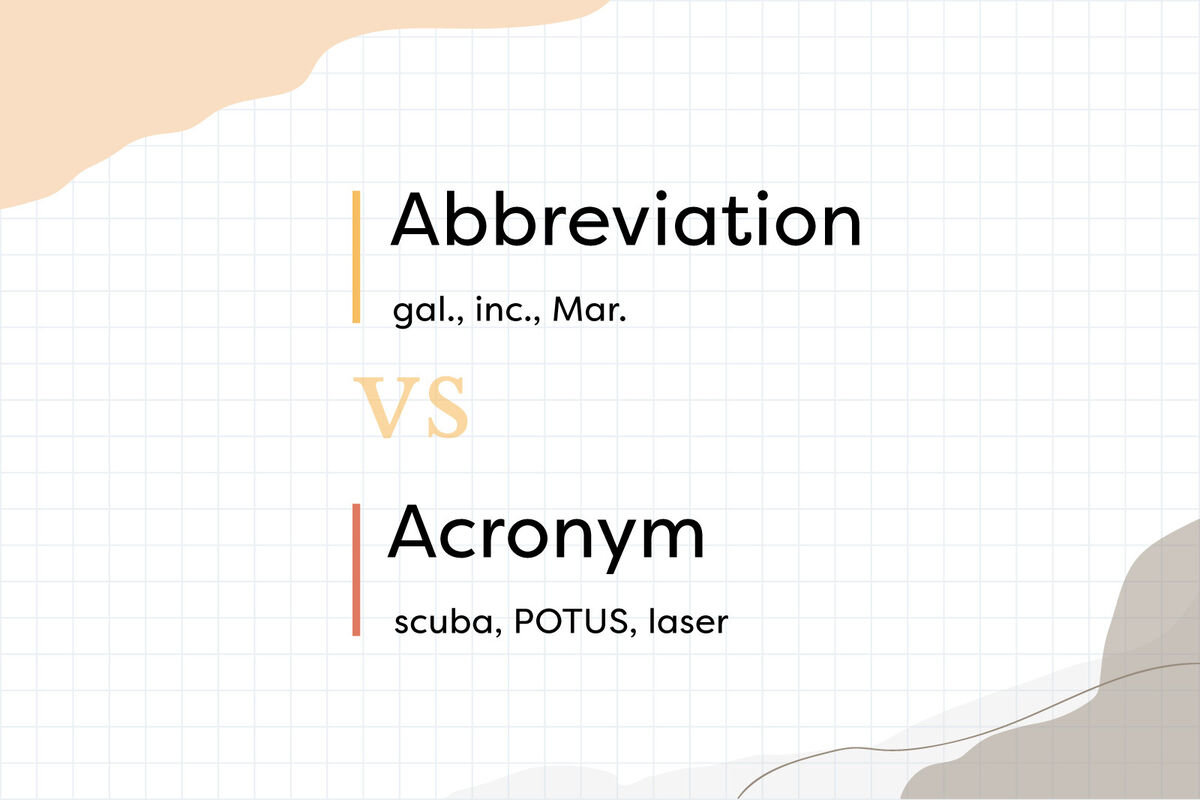
Abbreviations and acronyms are both shortened forms of words or phrases. An abbreviation is a shortened version of a longer word (such as Dr. or Prof.), while an acronym forms a new word using the first letter of each word from a phrase (such as radar or ASAP). Writers often use the words abbreviations and acronyms interchangeably, yet the two are quite distinct.
What Are Abbreviations?
An abbreviation is a shortened form of a word or phrase, such as Mr. for Mister or hr. for hour. Abbreviations are still read as the full word or words, but they’re easier to write and generally understood to represent the full word. There are millions of common abbreviations used every day, including:
St. or Ave. (instead of Street or Avenue)
Mon., Tues., Wed., Thurs., Fri., Sat., and Sun. (days of the week)
Jan., Feb., Mar., Apr., Jun., Jul., Aug., Sept., Oct., Nov., Dec. (months of the year)
Ex. (for the word example)
cm. or in. (for centimeter or inch)
vs. (shortened from the word versus)
When you say these abbreviations out loud, you say the full word they represent. For example, when reading the abbreviation Dec., you would still say “December” because Dec. is simply a written shorthand for the full word.
Older Abbreviations
You may have wondered why some abbreviations, such as those for ounce (oz) and pound (lb), include letters that aren't part of the original word. In these cases, the abbreviations are based on older forms of the word. For example, ounce comes from the Italian word onzo (abbreviated to oz) and pound comes from the Latin libra pondo (abbreviated to lb).
What Are Acronyms?
An acronym uses the first letter of each word in a phrase to spell out another word. Some acronyms create new words that are so commonly used, we forget they're actually a series of letters from a longer word or phrase. For example, when we go scuba diving, we rarely consider the fact that scuba is an acronym of "self-contained underwater breathing apparatus."
Initialisms
Would you consider VIP to be an acronym? Technically, it's an initialism. Initialisms are a series of initial letters of words or a phrase that form an abbreviation but aren't pronounced as a word. We enunciate each letter (“Vee-eye-pee,” not “vip”).
Many consider initialisms to be a subset of acronyms, so whether you pronounce ASAP as a word or enunciate each letter, it's still an acronym. However, be aware that others say it is another form of abbreviation.
Examples of Abbreviations vs. Acronyms
Test out your knowledge with a few more examples of abbreviations and acronyms. Additionally, compare these examples of common initialisms to ensure you know the difference between them, as well.
Abbreviations | Acronyms | Initialisms |
Capt. (Captain) | radar (radio detection and ranging) | ATM (automated teller machine) |
inc. (incorporated) | scuba (self-contained underwater breathing apparatus) | NFL (National Football League) |
et al. (et alii) | NASA (National Aeronautics and Space Administration) | FAQ (frequently asked questions) |
gal. (gallon) | laser (light amplification by stimulated emission of radiation) | brb (be right back) |
est. (established) | POTUS (President of the United States) | idk (I don't know) |
pub. (published) | gif (graphics interchange format) | a/c (air conditioning) |
min. (minute) | SIM card (subscriber identification module) | aka (also known as) |
appt. (appointment) | ZIP code (zone improvement plan) | fyi (for your information) |
jr. (junior) | AIDS (acquired immune deficiency syndrome) | HIV (human immunodeficiency virus) |
vol. (volume) | taser (Thomas A. Swift's Electric Rifle) | ufo (unidentified flying object) |
Keep It Short
Abbreviations and acronyms are shortened versions of words and phrases that help speed up our communication. Initialisms act in the same way. Before you use any type of abbreviation, consider your audience, and consult available reference guides: